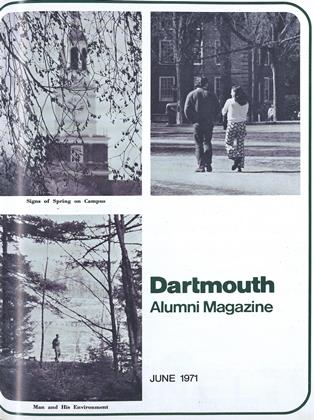WEIRD AND TRAGIC SHORES: THE STORY OF CHARLES FRANCIS HALL, EXPLORER.
JUNE 1971 KENNETH PAUL '69By Chauncey C. Loomis(Associate Professor of English). NewYork: Alfred A. Knopf, 1971. 367 pp.$8.95.
Charles Francis Hall sought the North Pole a century ago "to make good the belief that man will prevail on his earth," as Chauncey Loomis writes. Though he reached points farther north than any modern man before him, Hall died in Thank God Harbor and was buried in the frozen ground in a casket made by ship's carpenter Nathaniel Coffin. This biography of Hall, missionary, pioneer, and flim-flam man, is a case study of the potential and the mortality of the species.
Wierd and Tragic Shores is a marvelously rich book. Its author, who teaches English, is also explorer-writer-photographer-pilot-naturalist extraordinaire. Though his book is meticulously researched, its wit and style make this a layman's treasure. It would hold interest as biography or social history, as tragedy or adventure story. Weird andTragic Shores is of course all of these.
In his Prologue, Professor Loomis introduces the magnetic, ambivalent Arctic and one of its most famous challengers, Sir John Franklin. The disappearance of Franklin's Erebus and Terror caught the imagination of Old and New Worlds. (Joseph Conrad used the ships as shadow in Heart of Darkness, and the last investigation of their remains was conducted by Canada in 1967.) An obscure Cincinnati engraver who had emigrated from New Hampshire, Hall caught the arctic fever at age 36 in 1857. He did not break free — nor will the reader — until the end, in 1871.
The belated autopsy Loomis supervised 97 years later raised provocative questions about Hall's death, but Loomis has wisely balanced his book so that its appeal is far broader than to an audience of necrophiles.
There are glimpses of the Civil War and the early Gilded Age that are as crisp and expressive as Walker Evans photographs. Though he was sometimes paranoid about them and often referred to them as children, Hall was a loving friend of the "Esquimaux" and learned to live among them as no white man had. His journals are splendid documents, as wild and brilliant as Carlyle; capitalized and italicized ravings intermingle with shrewd analysis.
Towering above the wreckage of his cherished dream, the Polaris expedition, is Hall himself. He is perhaps a difficult figure to engage. Nothing is known about his youth, and his contradictory personality makes his feats seem miraculous. It never-theless becomes astonishing that he never before found a biographer, for Hall embodied his age. With no education, no fortune, no visible genius, this tough-minded Romantic wangled support for his expedition from men like Cyrus Field and U.s. Grant.
Reviewing a friend's work—Chauncev Loomis advised me on a Thackeray thesis - is a guilty enterprise. But I shall feel only if I fail to convince you that this is a remarkable book, one that will fin weekend with suspense and rare pleasure.
A Daniel Webster National Scholar, JuniorPhi Beta Kappa, Senior Fellow, Valedictorian, Mr. Paul teaches English at theConcord (New Hampshire) High School.On a James B. Reynolds Scholarship he willstudy English at the University of London
 View Full Issue
View Full Issue
More From This Issue
-
 Feature
FeatureMan and His Environment
June 1971 By ALVIN O. CONVERSE -
 Feature
FeatureRETIRING FACULTY
June 1971 By B.B. -
 Feature
FeatureWhat Price Clean Air?
June 1971 By Robert B. Graham '40 -
 Feature
FeatureTeaching at a Communist University
June 1971 By NOEL PERRIN -
 Feature
FeatureThe Marxist View of Overpopulation
June 1971 By Charles W. Collier '71 -
 Article
ArticleA Second Life Through Heart Surgery
June 1971 By Daniel L. Dyer '39
KENNETH PAUL '69
-
 Letters to the Editor
Letters to the EditorLetters to the Editor
OCTOBER 1969 -
 Books
BooksPATTERNS IN THACKERAY'S FICTION.
APRIL 1970 By KENNETH PAUL '69 -
 Books
BooksTHE STICKS: A PROFILE OF ESSEX COUNTY, NEW YORK.
JANUARY 1973 By KENNETH PAUL '69 -
 Books
BooksTHE MYTH OF THE MIDDLE CLASS NOTES ON AFFLUENCE AND EQUALITY
APRIL 1973 By KENNETH PAUL '69 -
 Books
BooksIndividuals Alone
SEPT. 1977 By KENNETH PAUL '69 -
 Article
ArticlePatience Rewarded
JUNE 1978 By Kenneth Paul '69
Books
-
 Books
BooksShelf Life
May/June 2010 -
 Books
BooksMASSACHUSETTS PRACTICE. VOLUME 28. CONVEYANCING WITH FORMS.
JUNE 1968 By DOUGLAS L. LEY '35 -
 Books
BooksThe Medicine Man
APRIL, 1927 By Eugene F. Clark -
 Books
BooksFIRST PERSON: CONVERSATIONS ON WRITERS AND WRITING WITH GLENWAY WESCOTT, JOHN DOS PASSOS, ROBERT PENN WARREN. JOHN UPDIKE. JOHN BARTH, ROBERT COOVER
March 1974 By JOHN HURD'21 -
 Books
BooksGENERAL INTRODUCTION TO ETHICS
DECEMBER 1929 By Nelson Lee Smith -
 Books
BooksDizzying Truths
September 1978 By WALTER W. ARNDT

